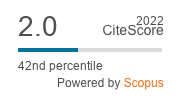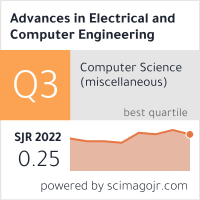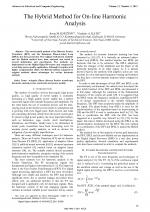| 3/2011 - 5 |
The Hybrid Method for On-line Harmonic AnalysisKNEZEVIC, J. M. |
| View the paper record and citations in |
| Click to see author's profile in |
| Download PDF |
Author keywords
adaptive filters, discrete Fourier transforms, harmonic analysis, power electronics and power quality
References keywords
power(20), harmonics(10), electronics(10), signal(9), industrial(9), time(7), harmonic(7), delivery(7), processing(6), adaptive(6)
Blue keywords are present in both the references section and the paper title.
About this article
Date of Publication: 2011-08-31
Volume 11, Issue 3, Year 2011, On page(s): 29 - 34
ISSN: 1582-7445, e-ISSN: 1844-7600
Digital Object Identifier: 10.4316/AECE.2011.03005
Web of Science Accession Number: 000296186700005
SCOPUS ID: 80055085161
Abstract
The novel hybrid method of the Discrete Fourier Transform (DFT) and the Enhanced Phase-Locked Loop (EPLL) has been presented. The original well-known methods and the Hybrid method have been analysed and tested in several simulations and experiments. The methods are implemented on the Digital Signal Processor and compared in a real time power quality application. Although it requires a bit higher computational effort, the Hybrid method compared to original methods shows advantages for on-line harmonic analysis. |
| References | | | Cited By |
Web of Science® Times Cited: 8 [View]
View record in Web of Science® [View]
View Related Records® [View]
Updated 2 days, 2 hours ago
SCOPUS® Times Cited: 10
View record in SCOPUS® [Free preview]
View citations in SCOPUS® [Free preview]
[1] Analysis of Real Overvoltage Disturbances by Using Nonstationary Signal Processing Techniques, VUJOSEVIC, S., MUJOVIC, S., DAKOVIC, M., Advances in Electrical and Computer Engineering, ISSN 1582-7445, Issue 3, Volume 15, 2015.
Digital Object Identifier: 10.4316/AECE.2015.03004 [CrossRef] [Full text]
[2] The Influence of Measurement Methodology on the Accuracy of Electrical Waveform Distortion Analysis, Bartman, Jacek, Kwiatkowski, Bogdan, Measurement Science Review, ISSN 1335-8871, Issue 2, Volume 18, 2018.
Digital Object Identifier: 10.1515/msr-2018-0011 [CrossRef]
[3] Least Squares Modeling of Voltage Harmonic Distortion Due to PC Cluster Operation, MUJOVIC, S., DJUKANOVIC, S., RADULOVIC, V., KATIC, V., RASOVIC, M., Advances in Electrical and Computer Engineering, ISSN 1582-7445, Issue 4, Volume 13, 2013.
Digital Object Identifier: 10.4316/AECE.2013.04022 [CrossRef] [Full text]
[4] Software Tool for Real-Time Power Quality Analysis, MIRON, A., CHINDRIS, M. D., CZIKER, A. C., Advances in Electrical and Computer Engineering, ISSN 1582-7445, Issue 4, Volume 13, 2013.
Digital Object Identifier: 10.4316/AECE.2013.04021 [CrossRef] [Full text]
[5] Analysis of the Power of a Three-phase Rectifier in Accordance with the Recommendations of the IEEE 1459–2010 Norm, Bartman, Jacek, Kwater, Tadeusz, Sobczynski, Dariusz, 2018 Progress in Applied Electrical Engineering (PAEE), ISBN 978-1-5386-6091-1, 2018.
Digital Object Identifier: 10.1109/PAEE.2018.8441044 [CrossRef]
[6] Power Quality Indicators Monitoring With SENTRON PAC4200, Rata, Gabriela, Rata, Mihai, 2022 International Conference and Exposition on Electrical And Power Engineering (EPE), ISBN 978-1-6654-8994-2, 2022.
Digital Object Identifier: 10.1109/EPE56121.2022.9959769 [CrossRef]
[7] Analysis of the deforming regime generated by different light sources, using reconfigurable system - CompactRIO, Rata, Gabriela, Rata, Mihai, Prodan, Cristina, 2014 International Conference and Exposition on Electrical and Power Engineering (EPE), ISBN 978-1-4799-5849-8, 2014.
Digital Object Identifier: 10.1109/ICEPE.2014.6970009 [CrossRef]
Disclaimer: All information displayed above was retrieved by using remote connections to respective databases. For the best user experience, we update all data by using background processes, and use caches in order to reduce the load on the servers we retrieve the information from. As we have no control on the availability of the database servers and sometimes the Internet connectivity may be affected, we do not guarantee the information is correct or complete. For the most accurate data, please always consult the database sites directly. Some external links require authentication or an institutional subscription.
Web of Science® is a registered trademark of Clarivate Analytics, Scopus® is a registered trademark of Elsevier B.V., other product names, company names, brand names, trademarks and logos are the property of their respective owners.
Faculty of Electrical Engineering and Computer Science
Stefan cel Mare University of Suceava, Romania
All rights reserved: Advances in Electrical and Computer Engineering is a registered trademark of the Stefan cel Mare University of Suceava. No part of this publication may be reproduced, stored in a retrieval system, photocopied, recorded or archived, without the written permission from the Editor. When authors submit their papers for publication, they agree that the copyright for their article be transferred to the Faculty of Electrical Engineering and Computer Science, Stefan cel Mare University of Suceava, Romania, if and only if the articles are accepted for publication. The copyright covers the exclusive rights to reproduce and distribute the article, including reprints and translations.
Permission for other use: The copyright owner's consent does not extend to copying for general distribution, for promotion, for creating new works, or for resale. Specific written permission must be obtained from the Editor for such copying. Direct linking to files hosted on this website is strictly prohibited.
Disclaimer: Whilst every effort is made by the publishers and editorial board to see that no inaccurate or misleading data, opinions or statements appear in this journal, they wish to make it clear that all information and opinions formulated in the articles, as well as linguistic accuracy, are the sole responsibility of the author.





